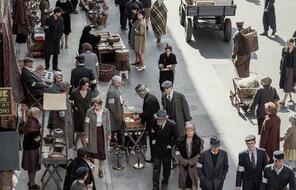Survival in Hiding
At a Glance
Language
English — USSubject
- History
- The Holocaust
Finding Safety in Italy
Many Jews went into hiding to avoid capture by the Nazis and their collaborators. Some concealed only their Jewish identity and continued to live in the open, using false identification papers. Others physically hid in attics, cellars, or other shelters. For most, hiding was a difficult decision that involved extraordinary risks. Many families, like Anne Frank’s, attempted to hide together. But often children were sent into hiding first because more people were willing to take in a child than an adult.
Nearly all Jews who went into hiding relied on others to help them, and they often felt that they were totally dependent on their helpers—for food and water, for news from the outside world, and especially for a willingness to continue to keep their secret. Usually, those in hiding gave their helpers money to pay for food and other supplies and to reward the helpers for making such a dangerous commitment. Sometimes Jews were hidden by neighbors or former employees whom they knew, and sometimes they were helped by strangers, but the risks of hiding changed the nature of even the closest and most trusted relationships.
Otto Wolf was 15 years old when his family went into hiding in the forest of a small Moravian town called Tršice, in occupied Czechoslovakia. In the summer of 1942, the Wolf family was ordered to report to a nearby city for deportation, but they chose not to do so. With the help of a family friend named Slávek, who was in love with Otto’s older sister Felicitas (known as Lici), they lived in shelters built in the woods near the town. Over the next three years, the family moved from various shelters in the forest to the homes of acquaintances, as each location became dangerous. Otto kept a diary throughout this period. 1
September 19, 1942, Saturday, 13th week. We sleep until ten, and then pray. We have bread with jam for lunch. I and Lici go for water. We are depressed, wondering how things will go. Who will give us sanctuary? [. . .] We have cheese and bread for dinner. They go to the bushes at 8 P.M. and wait for Slávek until half past ten, but in vain. Slávek does not come. We don’t know why, and hope that he will come tomorrow.
July 6, 1943, Tuesday, 55th week. We return to the forest at half past three. [. . .] Around five-thirty in the afternoon, we hear rustling. I climb a little higher up and see a person. He straightens up and sees me. When he recognizes me, he comes straight to us. It is Pluhař. He promises not to tell anyone, not even his wife. Then he leaves. We theorize extensively, and are really concerned that he went to turn us in. We wait to see what will happen next. The women are down below, and Dad and I go into the clearing. We hear more rustling around 8 P.M. and conclude that he is returning with a policeman. What a surprise! He comes with a loaf of bread and a little schmaltz [chicken fat]. He is assuming that we are hungry. What an outstanding deed! Dad gives him his black pants, and he is very happy. He says that he will return in the morning and bring milk and cigarettes. We are overjoyed and thank God that that’s the way things turned out. At ten, we go cooking. There is bread as well as laundry soap there. We make caraway soup with bread. The sky is glowering.
In early 1945, the Wolfs moved to a hiding place in the home of Mařenka Zbořilová, who had been their maid before the war. Her husband was uncomfortable that they were there.
March 4, 1945, Sunday, 141st week. Mařenka brings us breakfast upstairs, and we eat. Mr. Zbořil is carrying on like a madman: he does not want us here, and so forth. He goes to church, and we venture downstairs. For lunch, we have noodle soup. Mr. Zbořil comes home at noon, raging. He looks like a beast. We therefore think it wiser to retreat upstairs. Mařenka goes out to borrow a newspaper. When she returns, he rips the paper out of her hand and bellows that we had better be gone by morning. He even comes up to the attic to tell us that we must go, everyone in all the huts allegedly knows about us. [. . .] We can’t even eat dinner. Tonight, I sleep with my parents. During the night, Mr. Zbořil was out in the yard three times, cursing like a sailor.
On April 18, 1945, Soviet prisoners of war who were helping the German army conducted a raid on the village where the Wolfs were hiding. Searching for resistance fighters, they captured Otto Wolf and 22 other men. Otto’s family left the village to hide in the forest. His sister Felicitas immediately took over writing in the diary, believing that Otto would one day return.
April 20, 1945, Friday. We wake up at quarter after five and go to a clearing to move our feet a little since it has been dreadfully cold during the night. We have no blankets. We then pray: it is Yom Kippur Qatan. We fast until 1 p.m. At noon, I take the basket and go back to the Oheras’ for the most indispensable of indispensable items. When I get there, I find Mrs. Oherová running around as if she had lost her mind. She says that I must leave right away, that the criminal police have already been here twice and that they had left just before I arrived. [. . .] Each one of us has a tiny piece of bread with a little shmaltz for dinner. Before noon, an old woman roaming around the place scared us. We go to sleep at seven. 2
After liberation, the remaining members of the Wolf family learned that Otto had been killed after a local man revealed that he was Jewish. Otto was tortured by the Gestapo but never revealed where his family was hiding or the names of the people who had helped them. Felicitas eventually emigrated to the United States and donated the diary to the United States Holocaust Memorial Museum.
Connection Questions
- How do these diary entries help you understand the challenges of surviving in hiding? What needs did the Wolf family have? How did they find ways to meet their needs?
- How do Otto and Felicitas describe the intense stress that hiding created for their family? How did they cope?
- Who were some of the people the Wolfs encountered while in hiding? How do you account for the range of responses to the Wolfs?
- 1Alexandra Zapruder, ed., Salvaged Pages: Young Writers’ Diaries of the Holocaust (New Haven, CT: Yale University Press, 2002), 122–29.Reproduced by permission of Alexandra Zapruder.
- 2Alexandra Zapruder, ed., Salvaged Pages: Young Writers’ Diaries of the Holocaust (New Haven, CT: Yale University Press, 2002), 132, 136, 152, 156. Reproduced by permission of Alexandra Zapruder.
How to Cite This Reading
Facing History & Ourselves, "Survival in Hiding," last updated May 12, 2020.
This reading contains text not authored by Facing History & Ourselves. See footnotes for source information.








